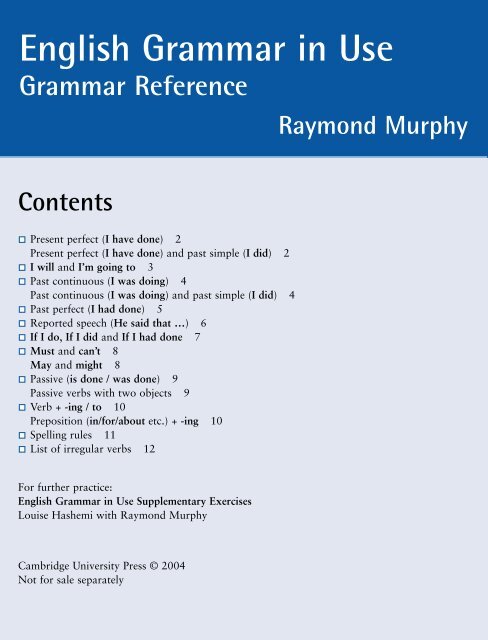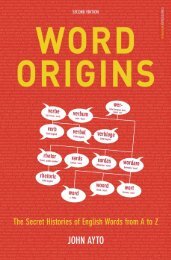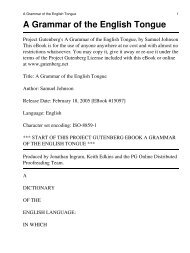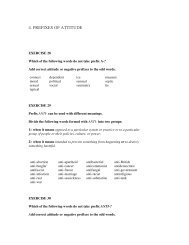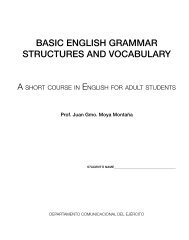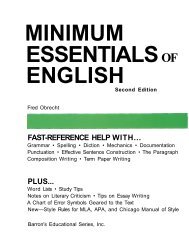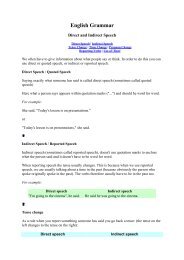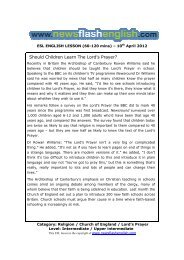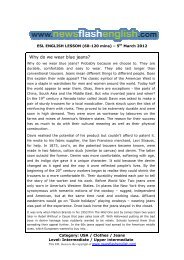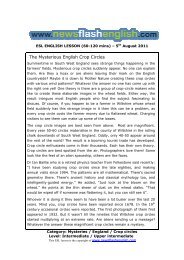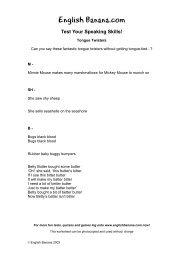English Grammar in Use
English Grammar in Use
English Grammar in Use
You also want an ePaper? Increase the reach of your titles
YUMPU automatically turns print PDFs into web optimized ePapers that Google loves.
<strong>English</strong> <strong>Grammar</strong> <strong>in</strong> <strong>Use</strong><strong>Grammar</strong> ReferenceRaymond MurphyContentsPresent perfect (I have done) 2Present perfect (I have done) and past simple (I did) 2I will and I’m go<strong>in</strong>g to 3Past cont<strong>in</strong>uous (I was do<strong>in</strong>g) 4Past cont<strong>in</strong>uous (I was do<strong>in</strong>g) and past simple (I did) 4Past perfect (I had done) 5Reported speech (He said that …) 6If I do, If I did and If I had done 7Must and can’t 8May and might 8Passive (is done / was done) 9Passive verbs with two objects 9Verb + -<strong>in</strong>g / to 10Preposition (<strong>in</strong>/for/about etc.) + -<strong>in</strong>g 10Spell<strong>in</strong>g rules 11List of irregular verbs 12For further practice:<strong>English</strong> <strong>Grammar</strong> <strong>in</strong> <strong>Use</strong> Supplementary ExercisesLouise Hashemi with Raymond MurphyCambridge University Press © 2004Not for sale separately
Present perfect (I have done)Tom is look<strong>in</strong>g for his key. He can’t f<strong>in</strong>d it.He has lost his key.He has lost his key = He lost it recently, and he stilldoesn’t have it.Have/has lost is the present perfect simple:I/we/they/you have (= I’ve etc.)he/she/it has (= he’s etc.)f<strong>in</strong>ishedlostdonebeen etc.The present perfect simple is have/has + past participle. The past participle often ends <strong>in</strong> -ed(f<strong>in</strong>ished/decided etc.), but many important verbs are irregular (lost/done/written etc.).For a list of irregular verbs, see page 12.Present perfect (I have done) andpast simple (I did)Now Tom has found his key. He has it now.Has he lost his key? No, he has found it.Did he lose his key? Yes, he did.He lost his key (past simple)but now he has found it. (present perfect)The present perfect (someth<strong>in</strong>g has happened) is a present tense. It always tells us about thesituation now. ‘Tom has lost his key’ = he doesn’t have his key now (see Unit 7).The past simple (someth<strong>in</strong>g happened) tells us only about the past. If somebody says ‘Tom losthis key’, this doesn’t tell us whether he has the key now or not. It tells us only that he lost hiskey at some time <strong>in</strong> the past.Do not use the present perfect if the situation now is different. Compare:They’ve gone away. They’ll be back on Friday. (they are away now)They went away, but I th<strong>in</strong>k they’re back at home now. (not They’ve gone)2
I will and I’m go<strong>in</strong>g toSue is talk<strong>in</strong>g to Helen:Let’s have a party.That’s a great idea.We’ll <strong>in</strong>vite lots of people.will (’ll): We use will when we decide to dosometh<strong>in</strong>g at the time of speak<strong>in</strong>g. Thespeaker has not decided before. The party isa new idea.decisionnowI’ll …SUELater that day, Helen meets Dave:Sue and I have decided to have a party.We’re go<strong>in</strong>g to <strong>in</strong>vite lots of people.HELENpast now future(be) go<strong>in</strong>g to: We use (be) go<strong>in</strong>g to when wehave already decided to do someth<strong>in</strong>g. Helenhad already decided to <strong>in</strong>vite lots of peoplebefore she spoke to Dave.decisionbeforeI’m go<strong>in</strong>g to …HELENDAVEpast now futureCompare:‘Gary phoned while you were out.’ ‘OK. I’ll call him back.’‘Gary phoned while you were out.’ ‘Yes, I know. I’m go<strong>in</strong>g to call him back.’‘Ann is <strong>in</strong> hospital.’ ‘Oh really? I didn’t know. I’ll go and visit her.’‘Ann is <strong>in</strong> hospital.’ ‘Yes, I know. I’m go<strong>in</strong>g to visit her this even<strong>in</strong>g.’When we say that ‘someth<strong>in</strong>g is go<strong>in</strong>g to happen’,the situation now makes this clear.The man is walk<strong>in</strong>g towards thewall now, so we can see that heis go<strong>in</strong>g to walk <strong>in</strong>to it.go<strong>in</strong>g tosituation nowfuture happen<strong>in</strong>g3
Past cont<strong>in</strong>uous (I was do<strong>in</strong>g)Yesterday Karen and Jim played tennis. They began at10 o’clock and f<strong>in</strong>ished at 11.30.So, at 10.30 they were play<strong>in</strong>g tennis.They were play<strong>in</strong>g = they were <strong>in</strong> the middle ofplay<strong>in</strong>g. They had not f<strong>in</strong>ished play<strong>in</strong>g.Was/were -<strong>in</strong>g is the past cont<strong>in</strong>uous:I/he/she/itwe/you/theywaswereplay<strong>in</strong>gdo<strong>in</strong>gwork<strong>in</strong>g etc.I was do<strong>in</strong>g someth<strong>in</strong>g = I was <strong>in</strong> the middle of do<strong>in</strong>g someth<strong>in</strong>g at a certa<strong>in</strong> time. The action orsituation had already started before this time, but had not f<strong>in</strong>ished:I started do<strong>in</strong>g I was do<strong>in</strong>g I f<strong>in</strong>ished do<strong>in</strong>gpast past nowThis time last year I was liv<strong>in</strong>g <strong>in</strong> Brazil.What were you do<strong>in</strong>g at 10 o’clock last night?I waved to Helen, but she wasn’t look<strong>in</strong>g.Past cont<strong>in</strong>uous (I was do<strong>in</strong>g) andpast simple (I did)Past cont<strong>in</strong>uous (<strong>in</strong> the middle of an action)I was walk<strong>in</strong>g home when I met Dave.(<strong>in</strong> the middle of an action)Kate was watch<strong>in</strong>g television whenwe arrived.Past simple (complete action)I walked home after the party last night.(= all the way, completely)Kate watched television a lot when shewas ill last year.4
Past perfect (I had done)at 10.30 at 11.00Bye!Hello!Sarah went to a party last week. Paul went to theparty too, but they didn’t see each other. Paul left theparty at 10.30 and Sarah arrived at 11 o’clock. So:When Sarah arrived at the party, Paul wasn’t there.He had gone home.Had gone is the past perfect (simple):I/we/they/youhe/she/itgone(= I’d etc.)had seen(= he’d etc.)f<strong>in</strong>ished etc.PAULSARAHThe past perfect simple is had + past participle (gone/seen/f<strong>in</strong>ished etc). For a list of irregularverbs, see page 12.Sometimes we talk about someth<strong>in</strong>g that happened <strong>in</strong> the past:Sarah arrived at the party.This is the start<strong>in</strong>g po<strong>in</strong>t of the story. Then, if we want to talk about th<strong>in</strong>gs that happenedbefore this time, we use the past perfect (had …):When Sarah arrived at the party, Paul had already gone home.Compare the present perfect (have seen etc.) and the past perfect (had seen etc.):Present perfectPast perfecthave seenhad seenpastnowpastnowWho is that woman? I’ve never seenher before.We aren’t hungry. We’ve just had lunch.The house is dirty. They haven’t cleanedit for weeks.I didn’t know who she was. I’d neverseen her before. (= before that time)We weren’t hungry. We’d just had lunch.The house was dirty. They hadn’tcleaned it for weeks.5
Reported speech (He said that …)I’m feel<strong>in</strong>g ill.You want to tell somebody what Paul said.There are two ways of do<strong>in</strong>g this:You can repeat Paul’s words (direct speech):Paul said, ‘I’m feel<strong>in</strong>g ill.’PAULOr you can use reported speech:Paul said that he was feel<strong>in</strong>g ill.Compare:direct Paul said, ‘ I am feel<strong>in</strong>g ill.’ In writ<strong>in</strong>g we use these quotationmarks to show direct speech.reported Paul said that he was feel<strong>in</strong>g ill.When we use reported speech, the ma<strong>in</strong> verb of the sentence is usually past (Paul said that … /I told her that … etc.). The rest of the sentence is usually past too:Paul said that he was feel<strong>in</strong>g ill.I told Lisa that I didn’t have any money.In general, the present form <strong>in</strong> direct speech changes to the past form <strong>in</strong> reported speech:am/is Æ was do/does Æ did will Æ wouldare Æ were have/has Æ had can Æ couldwant/like/know/go etc. Æ wanted/liked/knew/went etc.Say and tellIf you say who you are talk<strong>in</strong>g to, use tell:Sonia told me that you were <strong>in</strong> hospital. (not Sonia said me)What did you tell the police? (not say the police)Otherwise use say:Sonia said that you were <strong>in</strong> hospital. (not Sonia told that …)What did you say?But you can ‘say someth<strong>in</strong>g to somebody’:Ann said goodbye to me and left. (not Ann said me goodbye)What did you say to the police?TELL SOMEBODYSAY SOMEBODY6
If I do … and If I did …(1) Lisa has lost her watch. She tells Sue:LISA: I’ve lost my watch. Have you seen it anywhere?SUE: No, but if I f<strong>in</strong>d it, I’ll tell you.In this example, Sue feels there is a real possibility that she will f<strong>in</strong>d the watch. So she says:if I f<strong>in</strong>d … , I’ll … .(2) Joe says:If I found a wallet <strong>in</strong> the street, I’d take it to the police station.This is a different type of situation. Here, Joe doesn’t expect to f<strong>in</strong>d a wallet <strong>in</strong> the street;he is imag<strong>in</strong><strong>in</strong>g a situation that will probably not happen. So he says:if I found … , I’d (= I would) … . (not if I f<strong>in</strong>d … , I’ll …)When you imag<strong>in</strong>e someth<strong>in</strong>g like this, you use if + past(if I found / if there was / if we didn’t etc.).But the mean<strong>in</strong>g is not past:What would you do if you won a million pounds?(we don’t really expect this to happen)If I had known …Last month Gary was <strong>in</strong> hospital for a few days. Rachel didn’t know this, so she didn’t go tovisit him. They met a few days ago. Rachel said:If I had known you were <strong>in</strong> hospital, I would have gone to see you.Rachel said: If I had known you were <strong>in</strong> hospital … . This tells us that she didn’t know hewas <strong>in</strong> hospital.We use if + had (’d) … to talk about the past (if I had known/been/done etc.):I didn’t see you when you passed me <strong>in</strong> the street. If I’d seen you, of course I would havesaid hello. (but I didn’t see you)The view was wonderful. If I’d had a camera with me, I would have taken somephotographs. (but I didn’t have a camera)7
Must and can’tPresentI/you/he (etc.)mustcan’tbe (tired / hungry / at work etc.)be (do<strong>in</strong>g / go<strong>in</strong>g / jok<strong>in</strong>g etc.)do / get / know / have etc.You can use must to say that you believe someth<strong>in</strong>g is certa<strong>in</strong>:You’ve been travell<strong>in</strong>g all day. You must be tired. (Travell<strong>in</strong>g is tir<strong>in</strong>g and you’ve beentravell<strong>in</strong>g all day, so you must be tired.)You can use can’t to say that you believe someth<strong>in</strong>g is not possible:You’ve just had lunch. You can’t be hungry already. (People are not normally hungry justafter eat<strong>in</strong>g a meal. You’ve just eaten, so you can’t be hungry.)PastI/you/he (etc.)mustcan’thavebeen (asleep / at work etc.)been (do<strong>in</strong>g / look<strong>in</strong>g etc.)gone / got / known etc.I didn’t hear the phone. I must have been asleep.Tom walked <strong>in</strong>to a wall. He can’t have been look<strong>in</strong>g where he was go<strong>in</strong>g.May and mightPresentI/you/he (etc.)maymight(not)be (true / <strong>in</strong> his office etc.)be (do<strong>in</strong>g / work<strong>in</strong>g / hav<strong>in</strong>g etc.)know / work / want etc.We use may or might to say that someth<strong>in</strong>g is a possibility. Usually you can use may or might,so you can say:It may be true. or It might be true. (= perhaps it is true)She might know. or She may know.PastI/you/he (etc.)maymight(not) havebeen (asleep / at home etc.)been (do<strong>in</strong>g / work<strong>in</strong>g / feel<strong>in</strong>g etc.)known / had / wanted / left etc.A: I wonder why Kate didn’t answer the phone.B: She may have been asleep. (= perhaps she was asleep)A: I was surprised that Kate wasn’t at the meet<strong>in</strong>g yesterday.B: She might not have known about it. (= perhaps she didn’t know)8
Passive (is done / was done)The passive is be (is/was etc.) + past participle (done/cleaned/seen etc.):(be) done (be) cleaned (be) damaged (be) built (be) seen etc.For irregular past participles (done/seen/known etc.), see page 12.Present simpleactive: clean(s) / see(s) etc. Somebody cleans this room every day.passive: am/is/are + cleaned/seen etc.Many accidents are caused by careless driv<strong>in</strong>g.I’m not often <strong>in</strong>vited to parties.How is this word pronounced?This roomis cleaned every day.Past simpleactive: cleaned/saw etc. Somebody cleaned this room yesterday.passive: was/were + cleaned/seen etc.This roomwas cleaned yesterday.We were woken up by a loud noise dur<strong>in</strong>g the night.‘Did you go to the party?’ ‘No, I wasn’t <strong>in</strong>vited.’How much money was stolen <strong>in</strong> the robbery?Passive verbs with two objectsSome verbs can have two objects. For example, give:Somebody gave the police the <strong>in</strong>formation. (= Somebody gave the <strong>in</strong>formation to the police)object 1 object 2So it is possible to make two passive sentences:The police were given the <strong>in</strong>formation. orThe <strong>in</strong>formation was given to the police.Other verbs which can have two objects are:ask offer pay show teach tellWhen we use these verbs <strong>in</strong> the passive, most often we beg<strong>in</strong> with the person:I was offered the job, but I refused it. (= they offered me the job)You will be given plenty of time to decide. (= we will give you plenty of time)Have you been shown the new mach<strong>in</strong>e? (= has anybody shown you?)The men were paid £400 to do the work. (= somebody paid the men £400)9
Verb + -<strong>in</strong>gHere are some verbs that are followed by -<strong>in</strong>g:stop postpone admit avoid imag<strong>in</strong>e enjoy suggestf<strong>in</strong>ish consider deny risk fancy m<strong>in</strong>dSuddenly everybody stopped talk<strong>in</strong>g. There was silence.I’ll do the shopp<strong>in</strong>g when I’ve f<strong>in</strong>ished clean<strong>in</strong>g the flat.Verb + to …If these verbs are followed by another verb, the structure is usually verb + to … (<strong>in</strong>f<strong>in</strong>itive)offer decide hope deserve promiseagree plan manage afford threatenrefuse arrange fail forget learnIt was late, so we decided to take a taxi home.Simon was <strong>in</strong> a difficult situation, so I agreed to help him.Preposition (<strong>in</strong>/for/about etc.) + -<strong>in</strong>gIf a preposition (<strong>in</strong>/for/about etc.) is followed by a verb, the verb ends <strong>in</strong> -<strong>in</strong>g:preposition verb (-<strong>in</strong>g)Are you <strong>in</strong>terested <strong>in</strong> work<strong>in</strong>g for us?I’m not very good at learn<strong>in</strong>g languages.Sue must be fed up with study<strong>in</strong>g.What are the advantages of hav<strong>in</strong>g a car?Thanks very much for <strong>in</strong>vit<strong>in</strong>g me to your party.How about meet<strong>in</strong>g for lunch tomorrow?Why don’t you go out <strong>in</strong>stead of sitt<strong>in</strong>g at home all the time?Carol went to work <strong>in</strong> spite of feel<strong>in</strong>g ill.10
Spell<strong>in</strong>g rulesNouns, verbs and adjectives can have the follow<strong>in</strong>g end<strong>in</strong>gs:noun + -s/-es (plural) books ideas matchesverb + -s/-es (after he/she/it) works enjoys washesverb + -<strong>in</strong>g work<strong>in</strong>g enjoy<strong>in</strong>g wash<strong>in</strong>gverb + -ed worked enjoyed washedadjective + -er (comparative) cheaper quicker brighteradjective + -est (superlative) cheapest quickest brightestadjective + -ly (adverb) cheaply quickly brightlyWords end<strong>in</strong>g <strong>in</strong> -y (baby, carry, easy etc.)If a word ends <strong>in</strong> a consonant* + y (-by/-ry/-sy/-vy etc.)y changes to ie before the end<strong>in</strong>g -s:baby/babies story/stories country/countries secretary/secretarieshurry/hurries study/studies apply/applies try/triesy changes to i before the end<strong>in</strong>g -ed:hurry/hurried study/studied apply/applied try/triedy changes to i before the end<strong>in</strong>gs -er and -est:easy/easier/easiest heavy/heavier/heaviest lucky/luckier/luckiesty changes to i before the end<strong>in</strong>g -ly:easy/easily heavy/heavily temporary/temporarilyDoubl<strong>in</strong>g consonants (stop/stopp<strong>in</strong>g/stopped, wet/wetter/wettest etc.)Sometimes a word ends <strong>in</strong> vowel + consonant. For example:stop plan rub big wet th<strong>in</strong> prefer regretBefore the end<strong>in</strong>gs -<strong>in</strong>g/-ed/-er/-est, we double the consonant at the end. So p Æ pp,n Æ nn etc. For example:stop p Æ pp stopp<strong>in</strong>g stoppedplan n Æ nn plann<strong>in</strong>g plannedrub b Æ bb rubb<strong>in</strong>g rubbedbig g Æ gg bigger biggestwet t Æ tt wetter wettestth<strong>in</strong> n Æ nn th<strong>in</strong>ner th<strong>in</strong>nest11
List of irregular verbs12<strong>in</strong>f<strong>in</strong>itivebebeatbecomebeg<strong>in</strong>bendbetbiteblowbreakbr<strong>in</strong>gbroadcastbuildburstbuycatchchoosecomecostcreepcutdealdigdodrawdr<strong>in</strong>kdriveeatfallfeedfeelfightf<strong>in</strong>dfleeflyforbidforgetforgivefreezegetgivegogrowhanghavehearhidehitholdhurtkeepkneelknowlayleadleavelendletliepast simplewas/werebeatbecamebeganbentbetbitblewbrokebroughtbroadcastbuiltburstboughtcaughtchosecamecostcreptcutdealtdugdiddrewdrankdroveatefellfedfeltfoughtfoundfledflewforbadeforgotforgavefrozegotgavewentgrewhunghadheardhidhitheldhurtkeptkneltknewlaidledleftlentletlaypast participlebeenbeatenbecomebegunbentbetbittenblownbrokenbroughtbroadcastbuiltburstboughtcaughtchosencomecostcreptcutdealtdugdonedrawndrunkdriveneatenfallenfedfeltfoughtfoundfledflownforbiddenforgottenforgivenfrozengotgivengonegrownhunghadheardhiddenhitheldhurtkeptkneltknownlaidledleftlentletla<strong>in</strong><strong>in</strong>f<strong>in</strong>itivelightlosemakemeanmeetpayputreadrider<strong>in</strong>griserunsayseeseeksellsendsetsewshakesh<strong>in</strong>eshootshowshr<strong>in</strong>kshuts<strong>in</strong>gs<strong>in</strong>ksitsleepslidespeakspendspitsplitspreadspr<strong>in</strong>gstandstealstickst<strong>in</strong>gst<strong>in</strong>kstrikeswearsweepswimsw<strong>in</strong>gtaketeachteartellth<strong>in</strong>kthrowunderstandwakewearweepw<strong>in</strong>writepast simplelitlostmademeantmetpaidputread [red]*roderangroseransaidsawsoughtsoldsentsetsewedshookshoneshotshowedshrankshutsangsanksatsleptslidspokespentspatsplitspreadsprangstoodstolestuckstungstankstrucksworesweptswamswungtooktaughttoretoldthoughtthrewunderstoodwokeworeweptwonwrotepast participlelitlostmademeantmetpaidputread [red]*riddenrungrisenrunsaidseensoughtsoldsentsetsewn/sewedshakenshoneshotshown/showedshrunkshutsungsunksatsleptslidspokenspentspatsplitspreadsprungstoodstolenstuckstungstunkstruckswornsweptswumswungtakentaughttorntoldthoughtthrownunderstoodwokenwornweptwonwritten* pronunciation


